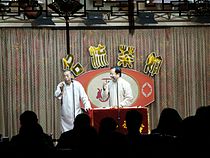This article needs additional citations for verification. (May 2019) |
| Crosstalk | |
|---|---|
 Xiangsheng performers in a Tianjin theater. | |
| Medium | Sound |
| Types | a traditional performing art in Chinese comedy |
| Originating culture | Chinese culture |
| Originating era | late Qing Dynasty |
| Xiangsheng | |||||||
|---|---|---|---|---|---|---|---|
| Traditional Chinese | 相聲 | ||||||
| Simplified Chinese | 相声 | ||||||
| Literal meaning | face and voice[1] | ||||||
| |||||||
Xiangsheng (traditional Chinese: 相聲; simplified Chinese: 相声; pinyin: Xiàngsheng; lit. 'face and voice'), also known as crosstalk or comic dialog,[2] is a traditional performing art in Chinese comedy, and one of the most popular elements in Chinese culture. It is typically performed as a dialog between two performers, or rarely as a monologue by a solo performer (similar to most forms of stand-up comedy), or even less frequently, as a group act by multiple performers. The Xiangsheng language, rich in puns and allusions, is delivered in a rapid, bantering style, typically in the Tianjin dialect (or in Mandarin Chinese with a strong northern accent). The acts would sometimes include singing, Chinese rapping, and musical instruments.
Xiangsheng has connections with the vaudeville Double act that developed in approximately the same era. Some Westerners have studied the art of Xiangsheng.[3][4] One Canadian student of Xiangsheng, Mark Rowswell, who uses the stage name of Dashan, has said that the closest English equivalent is "Who's on First?", a sketch by Abbott and Costello.[5] However, many acts in vaudeville and radio double acts, as well as the screen comedy dialog that evolved from them, are similar to Xiangsheng in their formula.
- ^ King-fai Tam; Sharon R. Wesoky (28 August 2017). Not Just a Laughing Matter: Interdisciplinary Approaches to Political Humor in China. Springer. pp. 76–. ISBN 978-981-10-4960-6.
- ^ Edward L. Davis (2 August 2004). Encyclopedia of Contemporary Chinese Culture. Routledge. pp. 1301–. ISBN 978-1-134-54953-5.
- ^ "Dashan - Ambassador to China's Funny Bone".
- ^ "Jesse Appell - Laowai in Beijing". One in a Billion. 2015-10-23. Retrieved 2021-09-29.
- ^ "What is Xiangsheng?". Dashan Online. Archived from the original on 2013-12-12. Retrieved 2013-11-29.